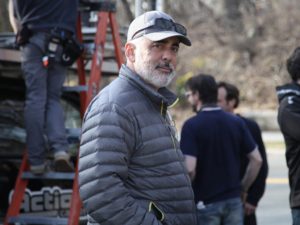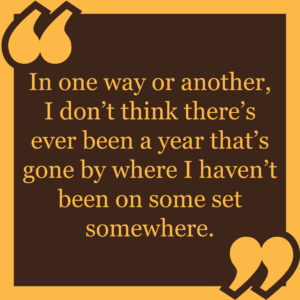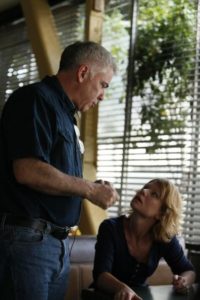
You’ve seen his face. You’ve heard his voice. You know his name. But, are you aware that Adam Arkin has worked behind-the-scenes on some of the most memorable and critically-acclaimed television shows of the last decade?
Whether he was directing episodes of “Justified,” “Fargo,” “The Americans” and “Sons of Anarchy,” or starring in series like “Masters of Sex,” “How to Get Away with Murder,” and the long-running “Chicago Hope,” Arkin has left an indisputable impression upon TV viewers, helping to shape the success of shows both in front of and behind the camera.
TrunkSpace sat down with Arkin to discuss his career, his craft, and what it’s like to direct himself in a scene.
TrunkSpace: You’ve been involved in film and television, in numerous capacities, for decades. What was the plan when you started out? Was it acting that drew you in and then your career fanned out from there?
Arkin: Yeah. I grew up around the business because of my father (Alan Arkin) and I was in love with the business… in love with my dad and separated from him a lot as a kid. My folks were divorced and his success was something that happened during the very formative years of my childhood when I was separated from him for long periods of time. So I think it was an idealized dream of mine to do what he did. I think I wanted to feel that connection with him and then found, after having pursued it for awhile, that I loved it. So I was working as early as my early teens doing theater and the occasional television commercial and things like that. By the time I graduated from high school I had gotten an agent in New York who had a branch office in Los Angeles and they felt that if I moved out to LA they could get me work, which proved to be the case. And I’ve been working ever since.
TrunkSpace: So did you spend time just absorbing everything, including the producing and directing side of things, having been on sets your whole life?
Arkin: Yeah. In one way or another, I don’t think there’s ever been a year that’s gone by where I haven’t been on some set somewhere. Even during the time that I was taking breaks and doing theater in New York, there was always an offshoot of some production or another that would have me on a film set somewhere. Or television set.
TrunkSpace: When you look at your career from the producing and directing side of things, can you directly point to individuals who influenced your style based on projects you starred in and sort of watched from afar (or up close)?
Arkin: There’s no one mentor I had as a director. There have been numerous mentors both through the admiration of people’s work… the inspiration of some of the great director’s whose work I have gotten to see. And then people I’ve had the good fortune to work with that have inspired me. I feel like I learn from everybody and I’m still learning. I feel like it’s kind of a constant opportunity to absorb more. There just isn’t enough you can know about all of the different things that go into filmmaking that won’t effect your abilities as a director. People that jump out at me that I have been inspired by? Certain folks… there’ll be no surprises… but the Coen Brothers, Scorsese, Sidney Lument, Jean Renoir, Truffaut, Kurosawa. Any of the great directors you can look at, and you’ll absorb something, even if it’s something as simple as their sense of framing or their willingness to take time with things. And just emerging yourself in the great storytelling abilities of the great directors will hopefully rub off with some kind of inspiration.
TrunkSpace: Do you think that being an actor makes you a better director?
Arkin: I think it gave me certain things that I appreciate as a director. I found, having done as much television as I did, I’ve worked with some really great directors and then I’ve also been surprised at, you know, pretty steady careers that don’t really become conversant with what goes into the nuances of performance. It’s one of the things that made me want to start directing when I was doing a lot of television, was just a hunch that by giving a little bit more focus to what it was I did know about acting that it could be my ticket in to bringing something to the table I didn’t see necessarily being prioritized by everybody.
TrunkSpace: Television, particularly in cable, has become what feels like mini movies. As a director you’re still tasked with putting that episode in the can within a particular time frame, even  while the method in which they’re shot has now changed. Has it gotten more difficult to direct television when each episode is bigger and more ambitious than the next?
while the method in which they’re shot has now changed. Has it gotten more difficult to direct television when each episode is bigger and more ambitious than the next?
Arkin: Yes, but I don’t think the onus of that falls exclusively on the director. I think one of the reasons there’s been that evolution in television is there has been a collective evolution on the part of everybody. The technology that goes into cinematography and lighting and the breakthroughs that allow things to be accomplished in those realms that used to not be within reach without the significant increase in time that is needed to do a feature. And I also just think that the storytelling has been liberated. I think that cable has allowed writers to explore more and in more depth than they were when everything was in the original network mentality. And that’s not to take away from the great work that was done in the golden age of early television, but I do think that way often times, in the sort of dramaturgical realm and not so much in the technical one we see today. But it is high stakes. And trying with a public that becomes more conversant with the more sophisticated technical aspects of filmmaking, to duplicate that on a television schedule is definitely a challenge, but it sort of seems to be what the marching orders are now, too.
TrunkSpace: Does it balance out a little, at least on the cable side, as seasons have become shorter and more manageable?
Arkin: Yeah. I’m on a show for Epix, in association with MGM, for “Get Shorty” and our first season is a 10 episode season and I think 10 episodes allows a kind of happy medium between letting the audience become really familiar with the characters and involved in an ongoing story, but not inundated with the grind of 22 episodes in a season where even under the best circumstances it’s very hard for that not to start feeling a little bit like a factory. Ten episodes seems to be that sweet spot where you can still… you have an elongated story arc for the main characters but few enough episodes that every one of them can be a standalone. You see the light at the end of the tunnel a lot sooner and I think it allows people to stay focused and committed to a project in a different way.
TrunkSpace: So when you go into a series with a 10 episode season, with it being shorter than standard networks, do you begin production with all 10 scripts complete or does that aspect still operate in the same way as a traditional show?
Arkin: In a perfect world you’ll have a number of scripts written ahead of time, but it’s very unusual for all of the scripts. There is the occasional show you’ll hear about where all episodes exist in scripted form before you start shooting, but more often than not, there will be a handful of scripts that are production-ready and then a handful that are in various drafts or even outline form that start getting more fleshed out as the start date approaches.
TrunkSpace: When you’re balancing being a director while also acting in a scene, how do you approach that? Can you flip the switch?
Arkin: You know, my first directing opportunities were on shows that I was a cast member on. In the earliest stuff that I did… not the very first thing I did, which was an episode of “Northern Exposure.” I was a cast member on that show but I was a recurring cast member and I didn’t appear in the episode that I directed. But a number of the next directorial opportunities that I had were on shows in which I was acting, so I kind of got used to that early on. And I also got used to directing episodes of shows in which I had been playing a character for awhile, so the aspect of nerves around the acting part of it were virtually nonexistant. My focus was primarily on the directing. The acting would pretty much take care of itself. It was usually arranged that I didn’t have to do any heavy lifting as an actor in the episodes I was directing. The producers I was working with would usually tailor it that way so that it didn’t become too much of a split concentration. But, the acting that I’ve done in things I’ve been directing most recently, “Fargo” I guess being a good example, or “Masters of Sex”… I did not find it that much of a split in concentration. I think partially just because I’ve been acting for, you know, 40 plus years. I’m able to kind of compartmentalize that part of it when I’m directing. It mostly feels like that it’s something to just kind of get through. The strangest thing about it is making sure that the actors that I’m working with actually feel like they have an acting partner as opposed to somebody that they’re having to play a scene with that’s watching them. I have to kind of assure them that when I’m acting in a scene, I’m just there as an actor and then I’ll review the work later. For the acting part of it, I’m sort of all in as an actor.
TrunkSpace: When we look at your list of director’s credits, one of the thru-lines we can’t help but draw is that they’re critically-acclaimed series that are really character driven. Do you specifically look for particular types of projects to work on?
Arkin: Yeah. I’m drawn to a few things, but certainly good writing and character-driven stuff. I also like to shake it up and I like variety, so I really enjoyed getting to work on things that were, you know, very dramatic and dark and then kind of mix that up with things that have a more comedic or lighter tone. I respond to quality material and when opportunities present themselves on shows that have writing and casts that are going to be inspiring, that’s where you’ll turn.

TrunkSpace: Your series “Chicago Hope” lasted for well over 100 episodes. If that series was pitched today, some 20 years later, what would have to change in order for it to be picked up?
Arkin: Well, as a network show I think that “Chicago Hope” would sell even today. I thought that the premise of “Chicago Hope” was a very viable one and I wish… I think sometimes that in the desire to compete with “ER,” which premiered at the same time and became such a phenomenon, that there was a little bit of a feeling that the network started retooling the show in order to compete with “ER” and in doing that it lost some of its original premise. The idea that this was not just a hospital show, but very specifically a show about the greatest hospital in the world and that the pressures and kind of rarefied atmosphere these doctors that were not only good at what they did, but so good at it that they were… you know, in the pilot my character was having a profile done on him by “NOVA” and developing new and cutting edge technologies. By any standards the show was a big success, but I think we lost something when we started trying to kind of rough it up and concentrate more on the emergency room. We kind of sacrificed our own identity a little bit and I think that might be a premise worth revisiting in the future.
TrunkSpace: Is there a goal or something that keeps you focused and looking forward in terms of something you hope to accomplish that you have yet to tackle?
Arkin: Sure. I definitely get excited about the relationship I have with the showrunner Davey Holmes on this project. (“Get Shorty”) I feel like it’s one of the first times I’ve done this particular job and felt like I was really being allowed to be a collaborative partner in a lot of the process, and that has been a long term goal of mine… to do the job in a way that finally felt like I was being entrusted with stuff. And I would like to see a continuing evolution of that nature, including in time, the development of some shows of my own.
Arkin’s new series “Get Shorty,” based on the novel by Elmore Leonard, will premiere on Epix this summer.






